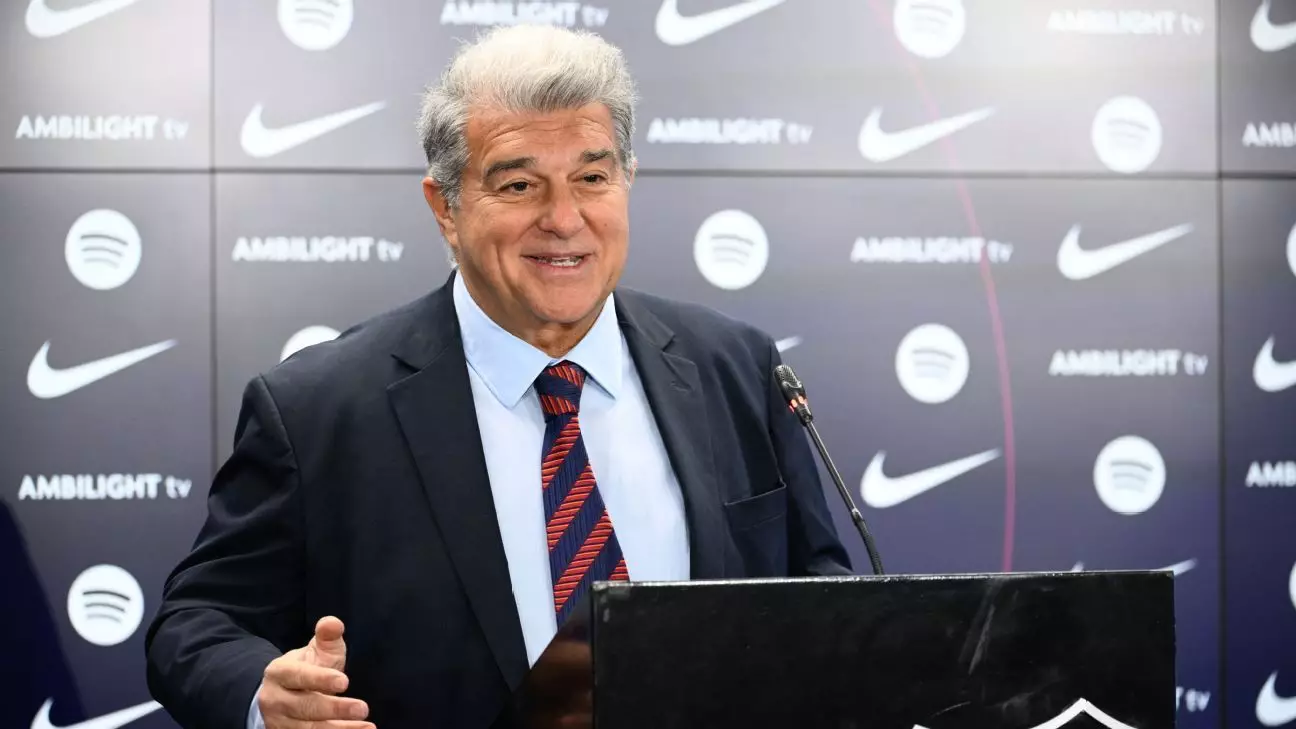In a recent press conference that lasted nearly two hours, FC Barcelona president Joan Laporta launched a fervent defense of the club amid ongoing controversies surrounding player registrations. He criticized not only external critics but also internal dissenters, asserting that a coordinated campaign aimed at destabilizing the historic club is underway. This backlash follows the refusal of LaLiga and the Royal Spanish Football Federation (RFEF) to register players Dani Olmo and Pau Víctor for the second half of the season, citing Barcelona’s alleged failure to comply with financial fair play (FFP) regulations by a critical December 31 deadline.
The situation surrounding Olmo and Víctor’s registrations is complex and reflects broader financial challenges that top-tier football clubs face in a post-pandemic landscape. LaLiga’s stringent enforcement of FFP rules is designed to prevent clubs from accumulating unsustainable debts, however, its application can sometimes seem capricious. Barcelona, with its rich history and significant global following, found itself at an intersection of financial scrutiny and stringent regulations, leaving its leadership scrambling to justify its decisions.
Laporta’s assertion that the club presented all necessary documentation by December 27, before being requested for further clarity, suggests ongoing communication issues with LaLiga. His claim that Barcelona was compliant with FFP guidelines is echoed by the recent ruling from Spain’s supreme sports council (CSD), which temporarily allowed registrations while the case is examined. Nevertheless, the club’s reputation hangs in the balance as it navigates this administrative quagmire.
Beyond merely defending the club’s actions regarding Olmo and Víctor, Laporta’s remarks hint at a more profound concern: the perceived threats from both external rivals and internal factions aiming to undermine Barcelona’s successes. He accused unnamed parties of attempting to erode the club’s foundations “at a key moment” when it is rebuilding with a promising young squad. The emphasis on preserving the club’s legacy, which spans 125 years, reflects Laporta’s intention to galvanize supporters during what are arguably challenging times.
He targeted specific opposition groups within the club, suggesting that their calls for his resignation during this tumultuous period were shortsighted. This criticism acts not merely as a defense of his tenure but also as a rallying cry for unity among supporters. By framing dissenters as traitors to the club’s interests, Laporta seeks to consolidate his support and reinforce the notion that Barcelona must remain steadfast in the face of adversity.
Laporta did not shy away from critiquing both rival clubs and the motivations behind their public statements regarding Barcelona’s situation. Teams like Atlético Madrid and Valencia have expressed dissatisfaction with the CSD’s interpretation of the rules, framing their criticisms as a collective effort to uphold integrity within the league. However, Laporta’s rebuttal positions these criticisms as opportunistic, suggesting that rivals see an opportunity to gain an upper hand against a historically successful adversary.
This dynamic underscores the competitive nature of LaLiga, where every advantage is scrutinized, and alliances often shift. The president’s mixed message serves to remind both supporters and opponents alike that intra-league politics can significantly influence perceptions and realities within the sport.
While defending the club’s stance on registrations, Laporta also elaborated on future financial strategies designed to ensure compliance with FFP regulations. An impressive contract with Nike, anticipated to double the club’s previous earnings and increase further beyond that point, illustrates a proactive approach for financial stability. Moreover, selling 475 VIP seats at the redeveloped Spotify Camp Nou for €100 million underscores the club’s efforts to secure additional revenue streams.
As dramatic shifts occur within the football landscape, Barcelona may well need to continue innovating in its financial strategies to maintain competitiveness. Conclusion-driven action, such as bolstering partnerships and extending revenue sources, will be essential for the club’s long-term success and for regaining trust among stakeholders.
Barcelona’s recent struggles highlight the intensity of pressures within professional football, where financial regulations, public perception, and internal cohesiveness are inextricably linked. With Laporta firmly at the helm, the club appears committed to weathering the storm, but the path ahead remains fraught with challenges. Should Laporta manage to unite the club’s factions while effectively navigating these fiscal hurdles, Barcelona may not only survive but thrive, continuing its legacy as one of the world’s most admired football clubs.

